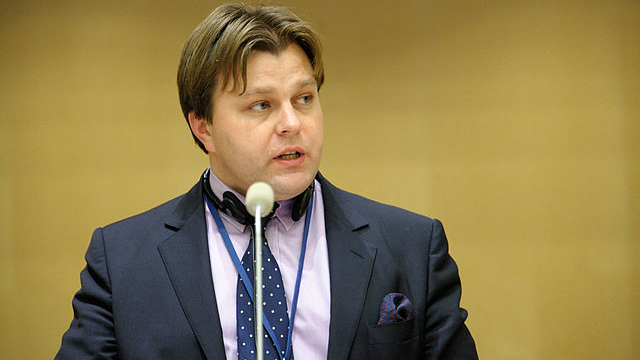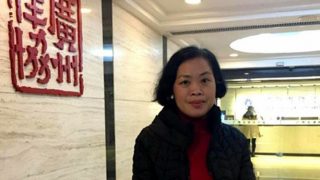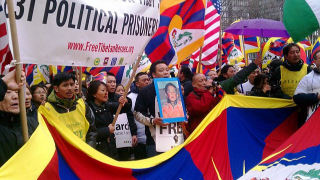A member of the Lithuanian Parliament, Adomėnas is one of the co-chairs of the Inter-Parliamentary Alliance on China (IPAC). He tells us why such an alliance is needed.
by Massimo Introvigne

Lithuanian MP Mantas Adomėnas is well-known as a staunch defender of human rights and religious liberty in China. Not everybody knows that he is also a distinguished scholar of Greek philosophy, specialized in the Pre-Socratic philosophers and Plato. He earned his Ph.D. at the University of Cambridge and was a lecturer there, before becoming an Associate Professor at the University of Vilnius. He is a member of the Lithuanian Parliament since 2008, and one of the co-chairs of the newly established Inter-Parliamentary Alliance on China (IPAC), an international group of parliamentarians advocating for a new approach to relations with China, and one taking into account the CCP’s aggressive policies and propaganda.
What are the IPAC’s purposes?
The Inter-Parliamentary Alliance on China was created to, I quote the mission statement, “foster deeper collaboration between like-minded legislators,” who share views on China and the growing PRC influence in the democratic world.
The IPAC grew out of the realization that, first of all, the strategic concepts that underpinned the engagement of the democratic world with China are obsolete, and no longer meaningful. Secondly, the states and politicians who took a principled stand on China used to do so in isolation.
Hence the need to establish a network of legislators who could pool their insights, construct coordinated responses, and work towards crafting a proactive, strategic approach to the PRC.
Of course, these are very early days yet. Nonetheless, activities are envisaged in five broad areas: safeguarding international rules based on order, and holding the PRC to the standards of the international law; upholding human rights; promoting trade fairness; strengthening security – developing complementary security strategies to address challenges presented by the PRC; as well as protecting national integrity – PRC must not be permitted to compromise the sovereignty or institutions of any developed or emerging markets through lending, investment, or by any other means.
The CCP has immediately accused the IPAC to “promote a new Cold War.” Whether or not a new Cold War existed between democratic countries and China was widely debated, well before IPAC was founded. What is your position? Is there a new Cold War? Do we need one?
The invocation of the “Cold War” is used by regimes such as Beijing and Moscow whenever they perceive that the free world is on the path of consolidating their stance to oppose their aggression and human rights violations. It is a bogeyman wheeled out every time the despotic regimes fear they may encounter a robust response. It is analogous, in a way, to Caligula’s reaction to the news that his brother was taking an antidote as a precaution against poisoning, “What?! An antidote against the emperor?!,” Caligula is reported to have exclaimed.
I am wary of giving old names to new realities; supposed historical analogies may be misleading. What I am convinced, though, is the following: that we cannot cling to the illusion of “constructive dialogue” with an increasingly brutal and aggressive totalitarian regime, which ignores the international treaties it has itself signed (such as the Sino-British Joint Declaration on Hong Kong). That we need a realistic, clear-eyed, coordinated, and strategic response if we are to check China’s growing propensity to aggression. And that the defense of international legal order and its integrity is the best way of protecting world peace.
As for the name, I do not object to the “New Cold War” – after all, the original Cold War was quite effective in ridding the world from that obnoxious totalitarian regime, the Soviet Union. If the New Cold War brings the chance of democracy to the Chinese people – who are themselves the primary victims of the Communist regime –, I am all for it.
Friends of Bitter Winter in Hong Kong have expressed disappointment after the mild reactions to the new security law by European leaders, particularly in Germany, France, and Italy. What can IPAC do to change this attitude?
The IPAC is a pressure group as well as a coordination network. And, I think, it is already having an impact. One shouldn’t expect instant results, but as the group – to which, at the moment of writing, parliamentarians from 14 national legislatures belong, as well as the European Parliament – establishes itself and grows in authority and stature, its stance will be increasingly difficult to ignore. We should gear ourselves to long-term perspective.
Also, we should engage in public debate on China. As long as the false narrative China tells about itself in the West remains unchallenged, the politicians who are ready to compromise with the genocidal Beijing regime will garner sufficient electoral support. It is an arduous and, prima facie, Sisyphean (or perhaps Augean?) work, but it needs doing. Democratic politics is changed in a lasting way only through engaging with the primary source of political mandate – the people.
In China, the CCP has compared the IPAC to the “eight-nation alliance” that entered China in 1900 after the Boxer Rebellion. In fact, the IPAC now includes parliamentarians from more than eight countries. And obviously how the CCP tells the story of the Boxer War is one-sided. The question, however, is whether initiatives such as the IPAC may not risk reinforcing the CCP’s narrative that China is under siege from the “imperialist” West.
The CCP will promote whatever narrative suits its purpose – it has the means and brazen disregard for reality to promulgate whatever version of the events it wants to tell its captive audience. There is little point trying at all costs not to offend. This coincidence should not distract us from the fact that it is China that is now the principal source of neoimperialist aggression and colonization of developing countries, through economic instruments and propaganda.
Your country, Lithuania, has a long history of resisting Communist religious persecution, and you have yourself promoted initiatives of solidarity with persecuted believers in China. Do you have a feeling that Lithuanian public opinion is conscious of the fact that in China religions are persecuted, and that members of groups like Falun Gong and The Church of Almighty God are routinely tortured and killed? And what about the public opinion in other European Union countries?
It is difficult for me to assess public climate in other European countries. I think the climate in Lithuania is changing, and very quickly, towards greater awareness of the religious persecution in China. The most prominent and atrocious cases – those of Falun Gong and The Church of Almighty God – ride on a crest of a mighty wave of persecutions of all religions: from the underground Catholic Church all the way to the Buddhists.
This is a poignant reminder to Lithuanians, who were for decades persecuted for practicing their religion. I think it is an important component in shaping Lithuanian public’s response, which is growing increasingly apprehensive of China.
You have often mentioned that Taiwan was among the first countries to recognize the independence of Lithuania. Clearly, decisions were taken in the past by the West about Taiwan that it is now difficult to change. Yet, during the COVID-19 crisis there was a widespread feeling that it would have been useful to have Taiwan, with its great know-how in handling epidemics, somewhat involved in the WHO. Realistically, what can be achieved about Taiwan and international organizations with the help of the IPAC?
I think parameters of the possible are very broad – from pressure to readmit Taiwan in the WHO as an observer, to switching diplomatic recognition from Beijing to Taipei. As the political stand-off deepens, such scenario is no longer an imaginary option.
We should start systematically questioning the “One China” principle. It no longer corresponds to political reality on the ground, and the way it is invoked by China has little foundation in the international law. Taiwan has never been part of the PRC and there is no legal basis to compel it to become part of that more recent geopolitical reality, which the Republic of China – Taiwan – antedates.
Invoking yet more ancient history is also questionable. Taiwan has been part of China for a shorter period than Vietnam was, for example, yet no one is suggesting Vietnam should revert to China.
At the IPAC, we should start developing and promoting a new legal concept which guarantees Taiwan the sovereignty it has de facto enjoyed for over 70 years. In other words, we should advocate Taiwan’s diplomatic recognition and membership of international organizations.
Do you have the impression that in some European countries politicians are reluctant to support the Uyghurs because of concerns about a public opinion hostile to Islam?
In my view, the pervasive (and pernicious) influence by China is a more significant factor in shaping vapid response to Uyghur persecution than the fear of Islamic radicalism. We should not get hooked on the Chinese propaganda, which justifies the CCP genocide of the Uyghurs through ritual invocation of “terrorism” – a staple justification for indiscriminate violence used by all tyrannical regimes.
What is truly surprising is the reticence of the Islamic-majority states on the Uyghur plight.
What happens in the Uyghur-inhabited East Turkestan is genocide pure and simple. I hope that one day Xi Jinping’s name will be synonymous with those of Hitler and Stalin. And I hope we can, through the IPAC, pressure the governments of the free world to adopt Uyghur-linked sanctions vis-à-vis China – before it is too late for the Uyghur people.
Both Lithuania and Italy host groups and initiatives that promote Tibetan religious culture, a subject that fascinates many Westerners. Yet, it seems difficult to translate this cultural interest into a political support for the human rights of Tibetans in Tibet. Is this just because some believe that Tibet is not worth endangering commercial relations with China, or is there a lack of knowledge about the religious persecution of Tibetan Buddhism? What can the IPAC do?
A certain apathy towards Tibet – it undeniably exists – is partly linked to the fact that the Tibetan case is decades-old, and nobody envisages any developments any time soon. It seems a romantic lost cause – yet the Tibetan people are being persecuted, murdered, indoctrinated, and displaced as we speak.
During the Cold War decades, people in the West similarly thought that the Baltic States, annexed by the Soviet Union, were a lost cause. Yet now I am talking to you from independent Lithuania which had been, for seven decades, lost to world history, its name expunged from the maps. What mattered and what helped to bring the restoration of independence was the principled stance of free world governments, who refused to recognize Soviet occupation of the Baltic States.
I hope that if we likewise persist, Tibet may yet have a chance.
Huawei is becoming a symbol of how China is colonizing the world through business and technology. Boris Johnson and other leaders have stated that it is time for the free world to reduce its economic dependence from China. Is this realistically possible? Will the IPAC offer suggestions, and mobilize for battles such as the ones about Huawei?
Not only possible, but it is the only realistic way forward – if we want to be able to protect our freedoms, our privacy, and our scope for action. Huawei battles are currently being fought in many parliaments – and yes, IPAC helps us with allies and ammunition, as it were. At the Lithuanian Parliament, National Security and Defence and Economics Committees recently voted for stringent control measures, which would prevent Huawei participation in the 5G network development. Of course, the Chinese pressure is intense. But I think the era of unopposed colonization by the CCP in Europe is over.
Source: Bitter Winter



